On May 15, 2025, the inaugural Accessible City Index Release Conference was successfully held at Shenzhen University. The Accessible City Index, a significant research achievement of the Shenzhen University School of Government and the Research Center for Disability Development in the Pioneering Demonstration Zone of Socialism with Chinese Characteristics (hereinafter referred to as the “Research Center”), serves as a guiding framework for promoting accessible city construction. In accordance with the Barrier-Free Environment Construction Law, an accessible environment not only concerns the well-being of people with disabilities but is also a necessary condition for the seamless mobility of the elderly, children, pregnant women, and individuals carrying large luggage. Key attendees at the conference included: Lyu Shiming, Member of the Standing Committee of the National People’s Congress and President of the China Volunteer Association for Assisting the Disabled; Pei Lei, Member of the Party Leadership Group and Deputy Director of the Shenzhen Municipal People’s Congress; Chen Hailong, Vice Chairman of the Guangdong Disabled Persons’ Federation, and Guo Wei, former Second-Level Inspector; He Yifei, Director, and Jiang Yong, Deputy Director of the Social Construction Committee of the Shenzhen Municipal People’s Congress; Zhao Qin, Vice Chairman of the Shenzhen Disabled Persons’ Federation; Liu Runhua, former Executive Vice Chairman of the Shenzhen CPPCC; Zhang Wanzhen, Chairman, and Huang Lichun, Vice Chairman of the Wenzhou Disabled Persons’ Federation; Lyu Zongshu, Chairman of the Guangzhou Yuer Charity Foundation; Deng Miao, Vice President of Huazhu Group; Li Haitao, Deputy General Manager of the Ground Service Department of China Southern Airlines Shenzhen Branch; as well as representatives from the Futian District Disabled Persons’ Federation, Shenzhen Qianhai Administration, Guangdong Barrier-Free Promotion Association, Shenzhen Barrier-Free Environment Promotion Association, CaoCao Mobility, and other advocates for accessible cities, Shenzhen People’s Congress deputies, representatives of persons with disabilities, and experts and scholars from universities such as Peking University, Tsinghua University, Zhejiang University, Sun Yat-sen University, and Shanghai University. Over 100 participants attended in total. The conference was hosted by Li Yonghua, Vice President of Shenzhen University.
The conference showcased the achievements since the implementation of the Shenzhen Special Economic Zone Accessible City Construction Regulations (hereinafter referred to as the Regulations), which took effect in September 2021 as China’s first local legislation on accessible city construction. The Regulations adopt a comprehensive urban development perspective, introducing the concept of an accessible city for the first time in China, explicitly designating persons with disabilities, the elderly, the injured or ill, pregnant women, children, and others with needs as beneficiaries. They reflect urban warmth and humanistic care across multiple dimensions and levels, providing robust legal support for Shenzhen’s establishment as a national model for accessible city construction.
Professor Mao Junfa, Academician of the Chinese Academy of Sciences and President of Shenzhen University, noted in his speech that May 15 marks the 14th “Global Accessibility Awareness Day.” Holding the Accessible City Index Release Conference on this significant date carries profound importance. The index will provide scientific evaluation and guidance for accessible city construction, promote widespread adoption of accessibility principles, make accessible facilities a standard feature of urban development, and enable every citizen to live, study, and work freely in the city. The release of the Accessible City Index is not only a significant research achievement by the Shenzhen University team but also a vital reflection of the university’s commitment to serving society, marking a major step forward in Shenzhen’s accessible city construction. Shenzhen University will take this conference as a new starting point, collaborating with various stakeholders, using the Accessible City Index as an entry point to continuously advance accessible city construction with Chinese characteristics, and striving to create a more inclusive and friendly social environment.
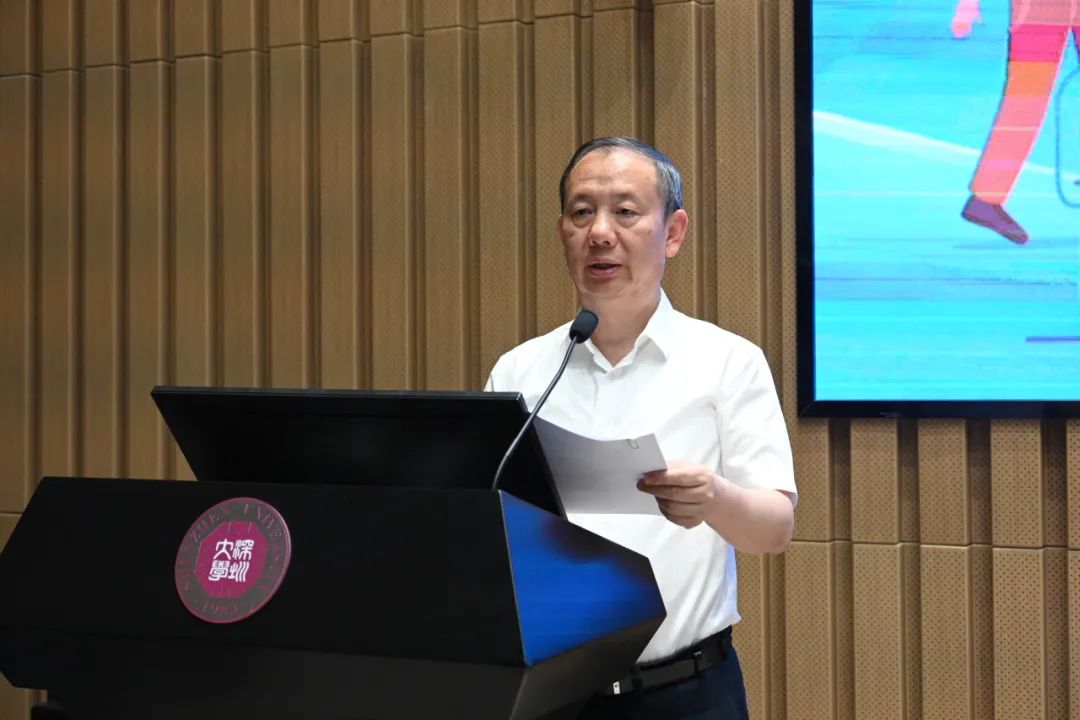
Professor Mao Junfa, Academician of the Chinese Academy of Sciences and President of Shenzhen University, delivers a speech at the conference
The “Accessible City Index” was officially released by Professor Zhou Lingang, Executive Director of the Research Center and Dean of the Institute of Public Welfare and Charity. Zhou Lingang emphasized that “accessibility” fundamentally embodies the concept of “access for all,” closely related to every member of society. The Accessible City Index comprises three dimensions—institutional safeguards, actions and outputs, and effectiveness and sustainability—divided into 10 secondary indicators: institutional leadership, government investment, facility construction investment, information accessibility, warmth of social services, enforcement of safeguards, professional certification benchmarks, compliance of specific scenarios, public participation, and support for innovative development. Each secondary indicator includes several operational tertiary indicators, totaling 39 specific indicators. The design of the Accessible City Index is based on the Barrier-Free Environment Construction Law, comprehensively reflecting and implementing the law’s requirements and standards for accessibility in “facility construction,” “information exchange,” and “social services.” Moving forward, with support from relevant authorities, the Research Center aims to promote the Accessible City Index to the Organizing Committee of the 15th National Games and Paralympic Games, collaborating with multiple departments to evaluate and commend exemplary venues for accessibility upgrades. It will gradually refine and release a series of actionable accessibility industry and scenario standards, focusing on high-speed rail stations, airports, hotels, parks, malls, hospitals, and campuses, to advance accessibility evaluations and construction in specific scenarios.
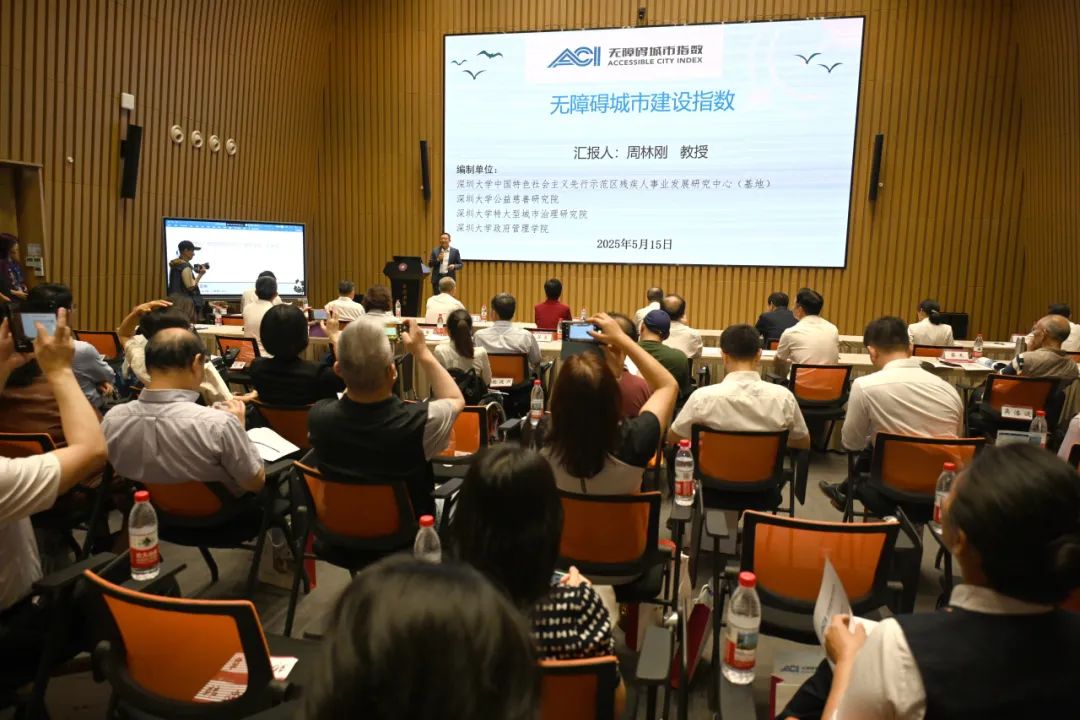
Professor Zhou Lingang releases the “Accessible City Index”
Cai Jingwen, Senior Project Manager of the Guangzhou Yuer Charity Foundation, released the first-round evaluation report on accessibility in Shenzhen’s parks and malls. The Foundation’s “Yuer Yijian” project focuses on accessibility issues, innovatively adopting a public evaluation model. Since 2024, it has developed two evaluation systems for malls and parks, formed a team of over 40 evaluators, and conducted more than 30 evaluation activities in Shenzhen, covering 18 malls and 8 parks, selecting the top three malls—Zhongzhou Bay C Future City, KK TIME, and Shangmeilin Joy City—and parks—Yuewan Bay Park, Lianhua Mountain Park, and Talent Park.
At the conference, Shenzhen University, Guangzhou Yuer Charity Foundation, and Huazhu Group signed a tripartite strategic cooperation agreement for “Accessible Hotel” evaluations. The signing was witnessed by Chen Hailong, Vice Chairman of the Guangdong Disabled Persons’ Federation; Yu Keping, Dean of the Shenzhen University School of Government; Li Dihua, Vice Dean of the School of Architecture and Landscape Design at Peking University; Professor Cai He from the Department of Sociology at Sun Yat-sen University; and Jie Yan, founder of One Plus One Disability Charity Group. Deng Miao, Vice President of Huazhu Group, stated that Huazhu Group has always adhered to its mission of creating wonderful journeys, integrating social responsibility into its corporate strategy. This collaboration with Shenzhen University and Guangzhou Yuer Charity Foundation reflects a strategic consensus on accessibility, promoting the hotel industry’s transition from physical accessibility to all-age-friendly inclusivity through standardized construction, innovative charity, and industry-academia-research collaboration. Huazhu Group will lead the development of China’s first accessible hotel industry standard, building a comprehensive accessibility experience. This signing exemplifies a “business for good” ecosystem, with Huazhu Group planning to launch an accessible hotel initiative to attract more partners and activate the power of socially responsible business.
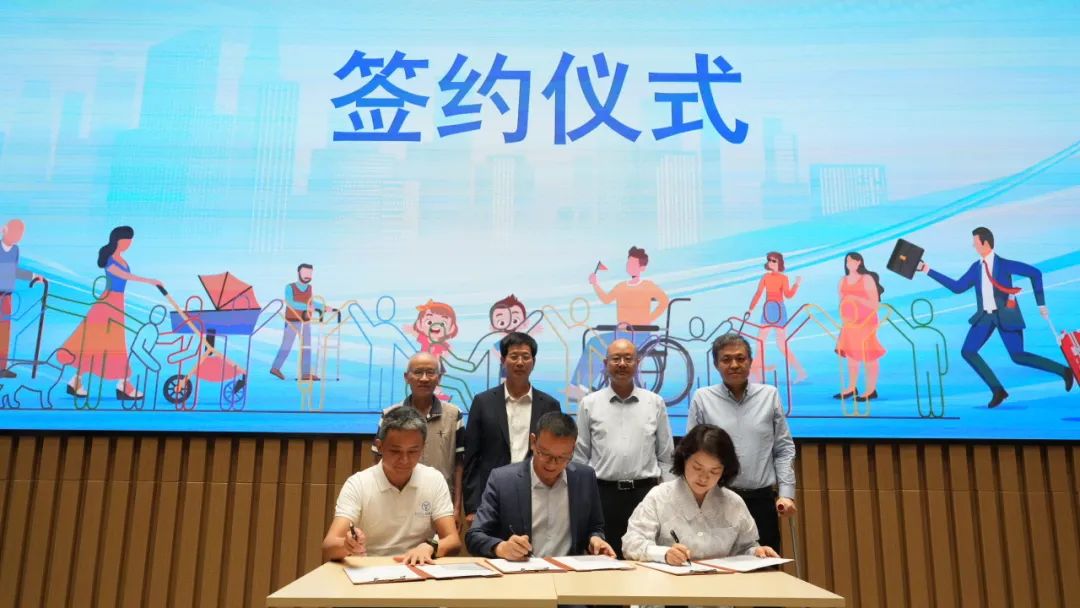
Tripartite Strategic Cooperation Agreement Signing Ceremony
Lyu Shiming, Member of the Standing Committee of the National People’s Congress and President of the China Volunteer Association for Assisting the Disabled, emphasized that an accessible environment is lifelong and universal, requiring continuous efforts from governments, society, universities, research institutions, and social organizations to deeply embed accessibility in public consciousness. The development of the Accessible City Index plays a vital role in promoting high-quality, innovative productivity for accessible environment construction, embodying a scientific methodology of integrity and innovation, and advancing the legal framework for accessibility from theory to practice. The process from index release to implementation and evaluation forms a comprehensive, closed-loop system. The Accessible City Index serves as an excellent toolkit, offering numerous tools for constructing, inspecting, supervising, and sharing successful cases of accessible environments.
Yu Keping, Dean of the Shenzhen University School of Government and Chair Professor at Peking University, noted that the release of the Accessible City Index, along with its subsequent development, testing, and evaluation, holds direct significance for implementing accessibility laws and construction plans, contributing to urban modernization with Chinese characteristics. The higher the degree of urban modernization, the fewer obstacles citizens face in their daily lives. Thus, accessible city construction is directly tied to urban modernization. Moreover, this contributes to the progress of societal civilization. Social civilization follows a “barrel effect,” where the overall level of civilization is determined not by its highest achievements but by its lowest points. The living conditions of persons with disabilities and those in need directly impact the degree of societal civilization progress, influencing everyone’s free and comprehensive development.
In the third phase of the conference, focusing on the critical topic of “Implementing the Accessible City Index,” Professor Shao Lei, Dean of Tsinghua University’s Accessibility Research Institute; Professor Liu Junqiang from Tsinghua University’s Department of Sociology; Liu Zhenjie, Researcher at the Policy Research Center of the Ministry of Civil Affairs; and other scholars highly praised the Accessible City Index, offering opinions and suggestions for its implementation. The roundtable discussion was moderated by Li Dihua, Vice Dean of Peking University’s School of Architecture and Landscape Design. Participants included Guo Wei, former Second-Level Inspector of the Guangdong Disabled Persons’ Federation; Jie Yan from One Plus One Disability Charity Group; Ni Yingjie, Director of Accessible Sign Language Education; Douyin influencer Xu Jiayuan; self-media influencer Zhang Yi; Professor Cai He from Sun Yat-sen University’s Department of Sociology; Liu Fang, Director of the Accessibility Research Institute at Shenzhen University’s Benyuan Design Research Center; Professor Jiao Can from Shenzhen University’s Mental Health Research Center; and Chi Yiran, a graduate student from Shanghai University’s School of Sociology. They engaged in lively discussions and interactions on implementing the Accessible City Index evaluations.
CaoCao Mobility’s Top Hat Accessible Ride Service provided barrier-free transportation for conference attendees in need throughout the event. It is reported that CaoCao Mobility has deployed over 1,000 accessible vehicles nationwide, operating in cities such as Shenzhen, Guangzhou, Suzhou, and Hangzhou, serving more than 5 million citizens.
The Accessible City Index Release Conference was co-hosted by the Shenzhen University School of Government, the Institute of Global Mega-City Governance, the Research Center for Disability Development in the Pioneering Demonstration Zone of Socialism with Chinese Characteristics, the Institute of Public Welfare and Charity, and the Guangzhou Yuer Charity Foundation, with support from the China Volunteer Association for Assisting the Disabled and the Shenzhen Accessible City Association.
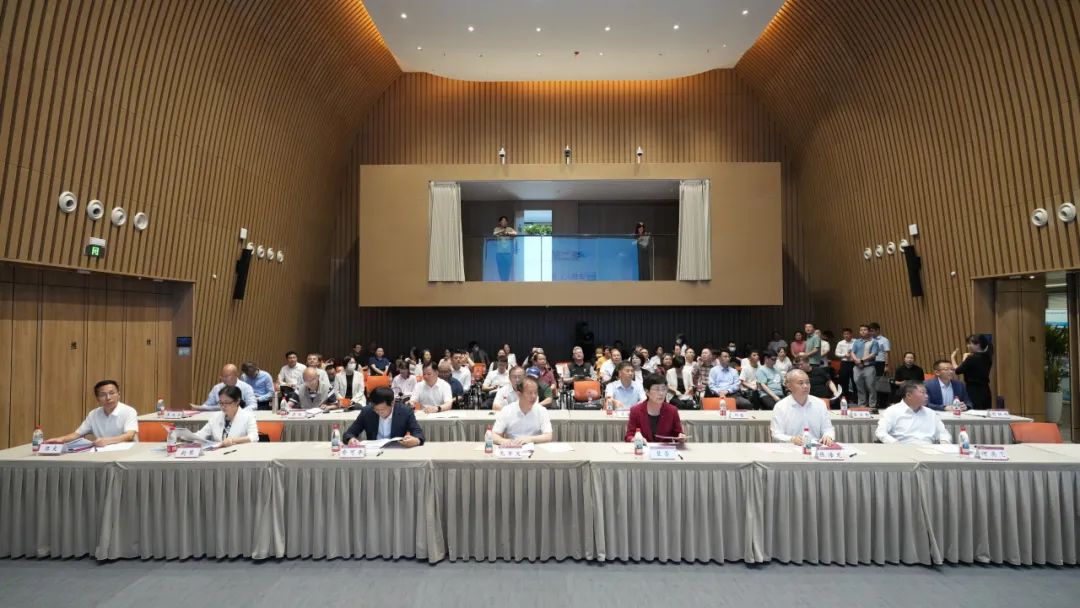
Scene from the Accessible City Index Release Conference
The conference garnered widespread media attention, with dedicated coverage by dozens of outlets, including Xinhua Net, Xuexi Qiangguo, China News Service, China Daily, China Youth Daily, China Science and Technology Network, Legal Daily, China Education Online, China Reform Network, Toutiao, Shenzhen Evening News, and Sina Finance.
Links to selected media reports:
Xinhua Net:
https://www.news.cn/expo/20250521/7988e32caa3149d7a185fb4438e67655/c.html
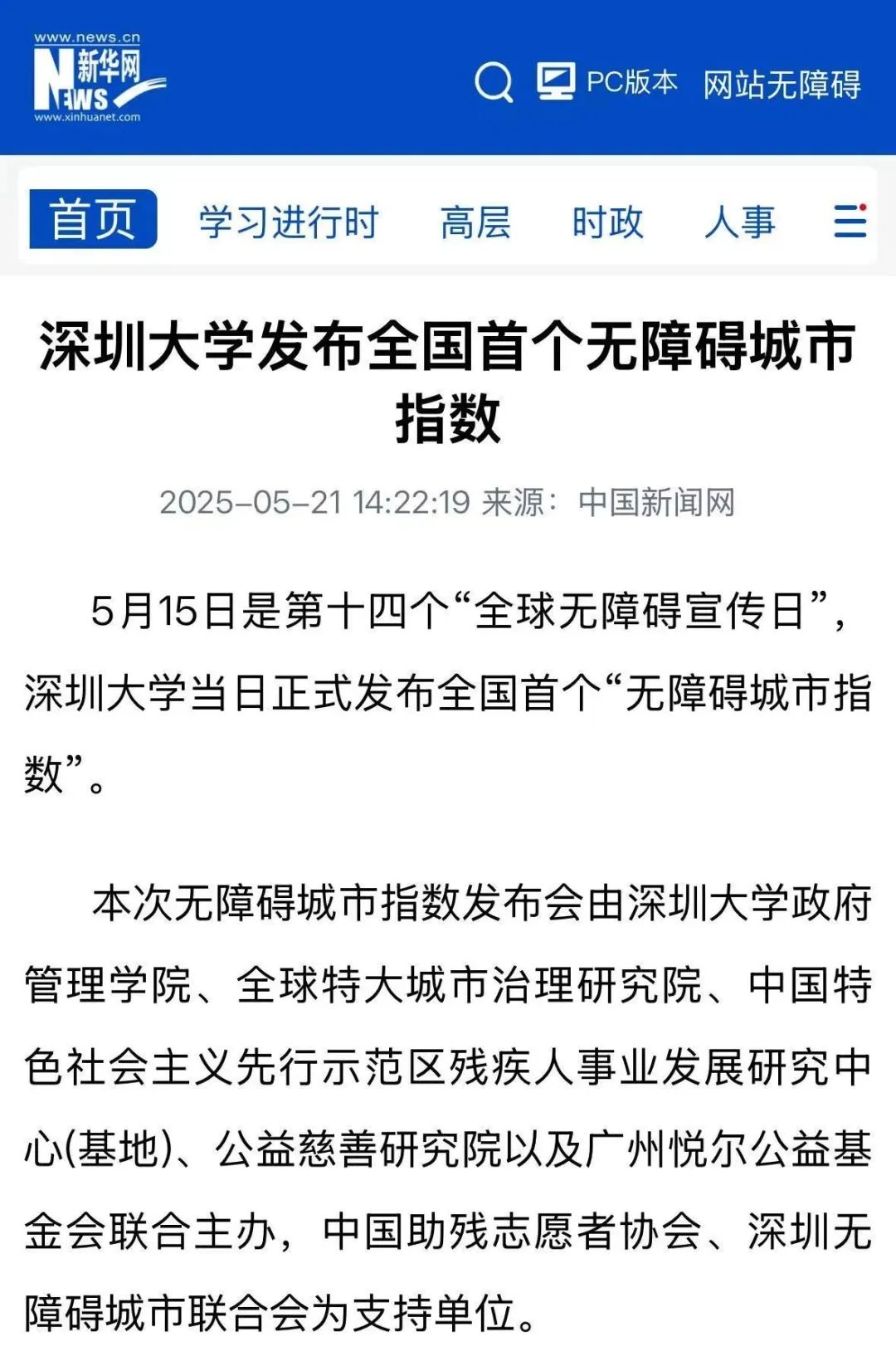
Xuexi Qiangguo:
https://article.xuexi.cn/articles/index.html?art_id=8262638882814592412&item_id=8262638882814592412&study_style_id=feeds_opaque&pid=&ptype=-1&source=share&share_to=wx_single
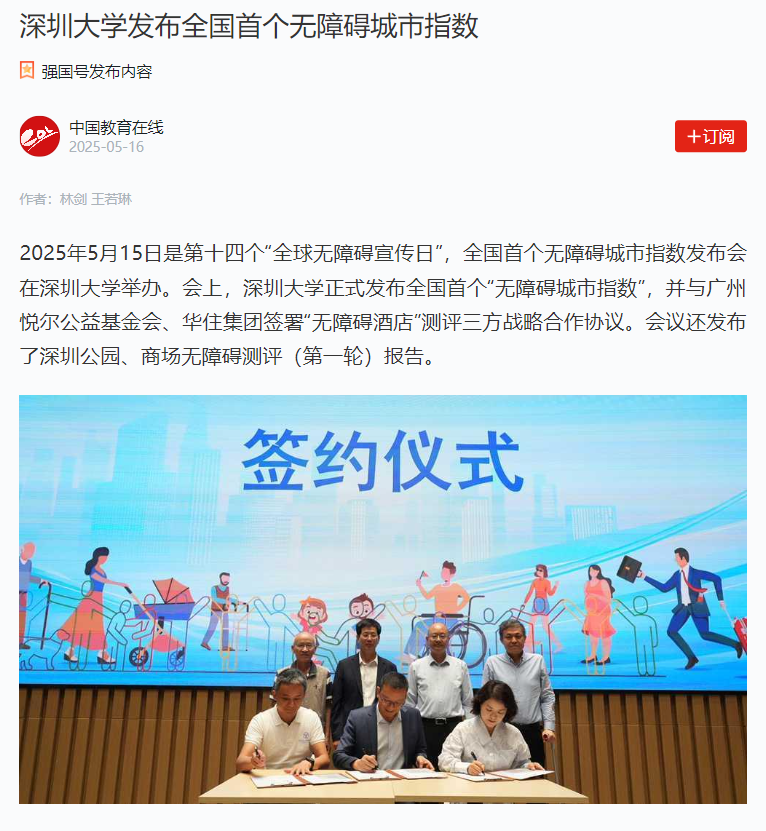
China News Service:
https://m.chinanews.com/wap/detail/chs/zw/10416443.shtml
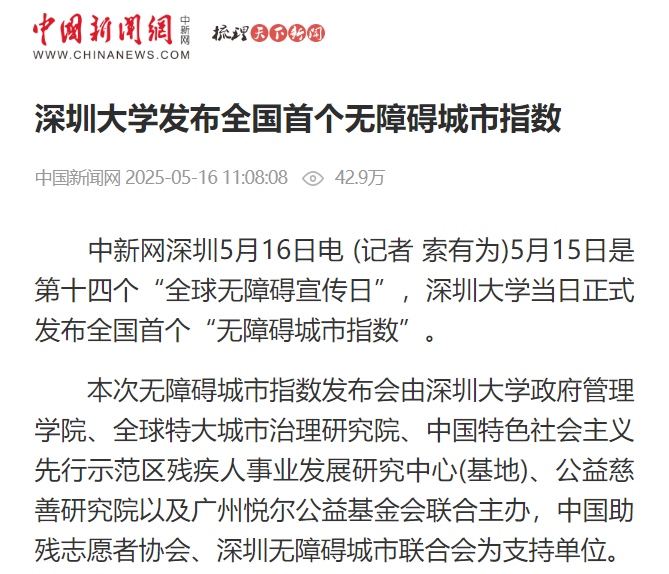
China Daily:
https://sz.chinadaily.com.cn/a/202505/16/WS68271d66a31020537703386c.html
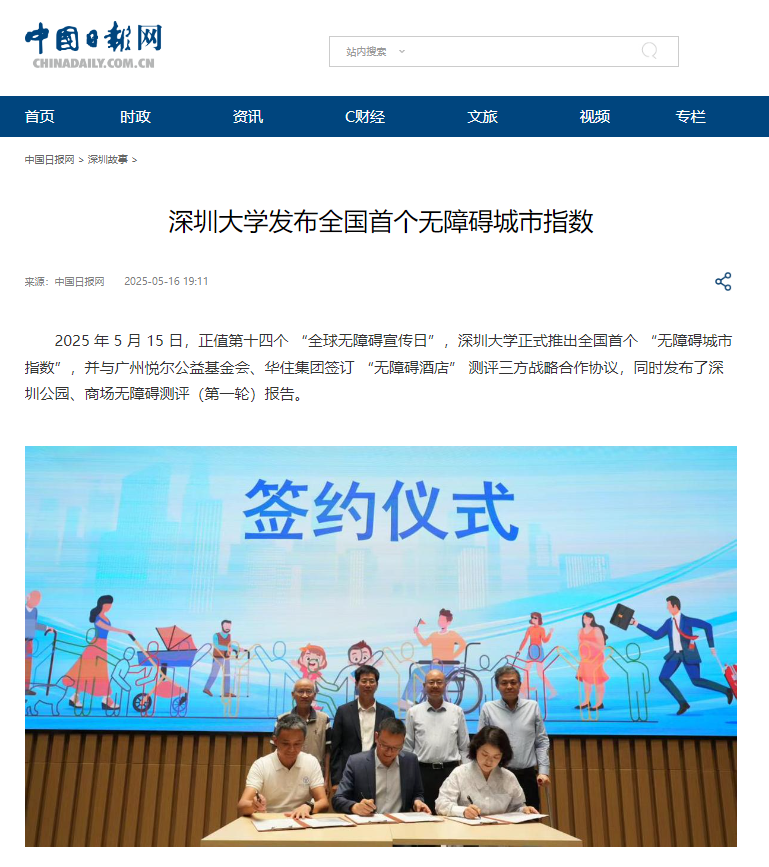
China Science and Technology Network:
https://www.stdaily.com/web/gdxw/2025-05/16/content_340389.html
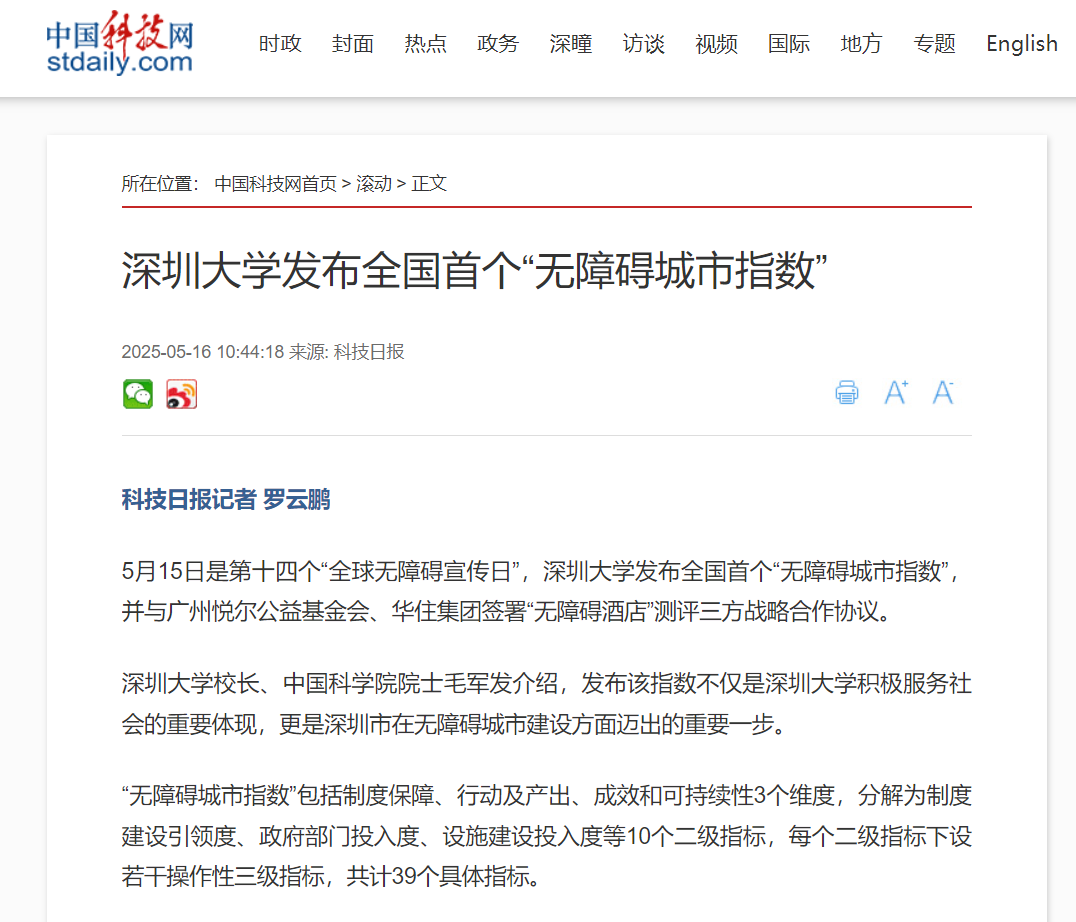
Legal Daily - Legal Network:
http://www.legaldaily.com.cn/index_article/content/2025-05/16/content_9183848.html
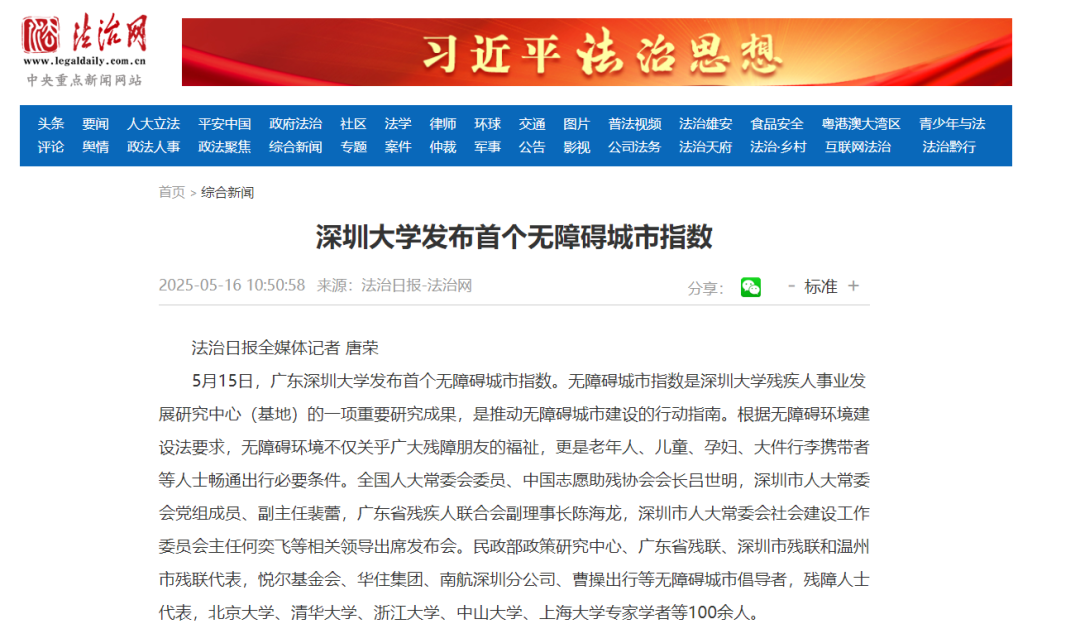
China Youth Daily:
https://s.cyol.com/articles/2025-05/16/content_2bMEB6f3.html?gid=Zr5xz31e
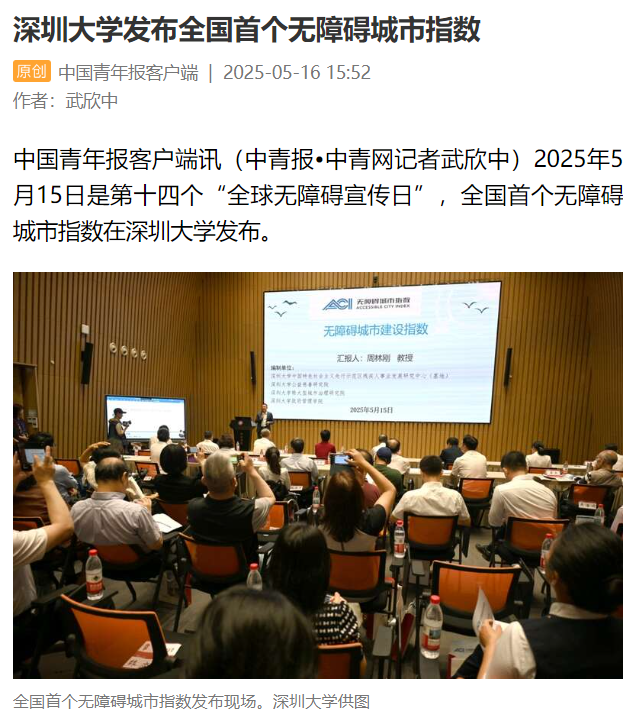
Layout | Liu Weirui
Initial Review | Luo Wenen
Secondary Review | Zhou Lingang, Chen Yonghai
Final Review | Gu Zhijun

